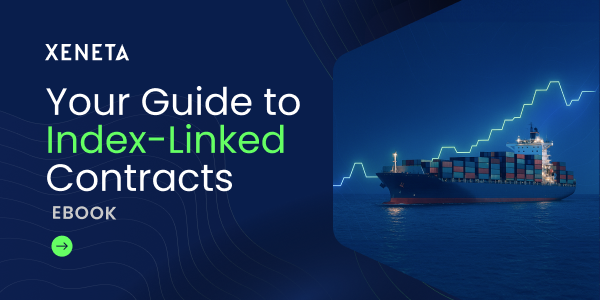Transparency Act Report 2025
We are the creators of the world’s largest ocean and air freight rate benchmarking and market analytics platform. Xeneta's core business is selling access to our platform that makes information about sea and air freight available. The platform aims to provide users with information that allows them to monitor the market and measure results. Access to our platform is sold to businesses around the world.
Our headquarters in Oslo is the heart of our organization, where our visionary leadership and culture of innovation and transparency drive our global initiatives forward. Meanwhile, our US, Germany, and UK offices are a strategic hub for our business development and customer support. With a worldwide footprint spanning continents, we aim to become the global ocean and air freight reference point.
Transparency is ingrained in everything we do, from decision-making processes to communication channels, ensuring that every member of our organization feels valued, informed, and empowered. With a team of 211 dedicated individuals from over 60+ nationalities spread across our offices, we work towards a shared vision of excellence. Diversity is our superpower; we transform differences into assets, embracing the distinct contributions of each individual as vital components of our shared achievements.

At Xeneta, we believe transparency builds trust. We are committed to complying with the requirements set out in the Norwegian Transparency Act, which entered into force on July 1, 2022 (Åpenhetsloven), and working on fundamental human rights and decent working conditions. We recognize these obligations as regulatory requirements and integral components of our responsibility to stakeholders, society, customers, and suppliers. At Xeneta, transparency is a fundamental principle that guides our actions, strengthens our relationships, and ensures that our operations are conducted with integrity and openness.
We recognize that respecting and promoting human rights is a moral imperative and fundamental to Responsible Business Practices (RBP). Our commitment to upholding human rights in alignment with the Organization for Economic Cooperation and Development (OECD), the International Labor Organization’s Declaration (ILO), and the Ten Principles of the United Nations Global Compact extends across every facet of our operations, from our supply chain to interaction with employees, customers, and communities. We are proud to say that our business activities do not contribute to or benefit from human rights abuses.
We operate with utmost respect for human rights standards, ensuring that our actions and decisions uphold the dignity and rights of every individual. This commitment is embedded in our values and enforced through the Xeneta Code of Conduct, which all employees and new joiners are required to read, agree to, and uphold to ensure our ethical standards are consistently maintained. Our firm belief is that everyone deserves to be treated with fairness, equality, and compassion. Our commitment to these principles ensures that we do not infringe upon or negatively impact anyone in our sphere of influence. We prioritize ethical conduct and accountability, understanding that our actions significantly impact the industry we operate in, defining not only who we are but also shaping the experiences of everyone with a direct or indirect relationship to our business.
Xeneta does not tolerate any harassment, discrimination, or bullying. We are an equal opportunity employer and make all decisions based on internationally recognized human rights policies. We are committed to ensuring fair wages and the right of workers to organize and join unions. We also adhere to and respect all applicable local labor laws and regulations in every location where we operate. Our culture creates a safe and healthy workplace environment where everyone, regardless of race, gender, sexuality, religion, or ability, feels valued and respected. We allow individuals to thrive based on skills, talents, and hard work rather than arbitrary barriers or biases.
We work under the mindset that ownership drives impact. Taking ownership of our actions and assuming responsibility for our outcomes fosters a culture of accountability and initiative, where employees are motivated to contribute their best efforts and take ownership of the company’s success. We prioritize proactive risk management to safeguard our operations and uphold our commitment to responsible business practices.
We have implemented a robust Third Party Risk Management (TPRM) framework as part of our commitment to transparency and responsible business practices. From the outset, third parties are thoroughly assessed in collaboration with internal teams to determine the level of risk they may pose.
This cross-functional approach allows us to systematically identify, evaluate, and prioritize potential risks, giving us a clear and comprehensive overview of our supply chain. It also strengthens our due diligence efforts by ensuring we focus on risks and adverse impacts that could affect our stakeholders and operations.
We utilize dedicated tools that help us detect and monitor these risks, enabling a more data-driven and consistent evaluation process. In addition, we conduct regular reviews of our third parties to ensure they remain aligned with industry standards and our ethical expectations. This ongoing monitoring allows us to proactively mitigate potential risks, including human rights-related ones, and address any adverse impacts before they escalate.
Our risk assessments conducted through our TPRM framework have provided valuable data and insights that directly inform our human rights due diligence strategies. This enables us to prioritize actions, safeguarding the well-being and dignity of all individuals involved in our operations. Through this proactive and structured approach, we meet our legal and ethical obligations and foster a culture of transparency, trust, and respect within our organization and with external partners. As a result of this ongoing effort, we have not identified any actual adverse human rights impacts across our operations to date.
We thrive in modernization through data; Xeneta’s operations are deeply rooted in data-driven decision-making. Data is the lifeblood that fuels our products and strategies, driving innovation, guiding our actions, and enabling continuous improvement. Our comprehensive risk assessments have led to tangible, positive outcomes, particularly in mitigating adverse impacts on human rights. These efforts have enhanced stakeholder trust, improved operational efficiency, and confirmed a low risk profile for Xeneta in areas related to human rights and decent labor conditions under the Transparency Act and OECD guidelines. Our third-party due diligence process ensures that all partners align with international human rights standards by reviewing indicators such as the Corruption Perception Index, Fragile States Index, and Sanctions Lists. We assess third parties' labor practices and require agreement with our Third Party Code of Conduct. A foundational document that upholds ethical behavior, respect for human dignity, and compliance with globally recognized human rights principles. Through this, we foster a responsible and values-driven network committed to a culture of respect, protection, and ethical collaboration.
We recognize that suppliers may operate within diverse cultural, economic, and regulatory contexts, and thus, their ethical standards and labor practices may vary. While we strive for consistency in upholding human rights and decent labor conditions across our supply chain, we understand that achieving uniformity may be challenging for all parties involved. We acknowledge and appreciate the efforts made by our suppliers to comply with human rights principles and improve labor standards within their operations.
We are committed to fostering open communication, providing support, and collaborating with suppliers to address challenges and implement meaningful improvements. By working together in a spirit of partnership and mutual respect, we aim to continuously raise the bar for ethical conduct and promote sustainable practices throughout our supply network.
As a young and growing company, we are committed to continuously enhancing our due diligence processes and methodologies to identify and mitigate potential risks related to human rights and decent working conditions. We recognize the importance of staying proactive and responsive to evolving challenges and expectations. Through ongoing learning, collaboration with industry experts, and leveraging technological advancements, we are dedicated to refining our risk assessment and detection approach. By embracing a culture of continuous improvement, we strive to uphold our commitment to ethical business practices, foster transparency, and safeguard the well-being of all individuals involved in our operations.
To ensure our workforce feels empowered to address internal human rights concerns, we have implemented multiple secure communication channels. These provide employees with a safe and confidential space to report any issues or violations they may encounter. We also promote open dialogue and active engagement between employees and management to foster trust, collaboration, and early identification of potential risks. This approach allows us to resolve concerns swiftly, uphold our commitment to human rights, and maintain a supportive, inclusive workplace where every voice is heard and respected.
Similarly, suppliers are encouraged to contact us at compliance@xeneta.com with any questions or concerns. This ensures that all stakeholders, internal and external, are empowered to contribute to our shared commitment to ethical conduct, transparency, and respect for human rights.

Patrik Berglund
CEO
Xeneta AS
%201.png)



